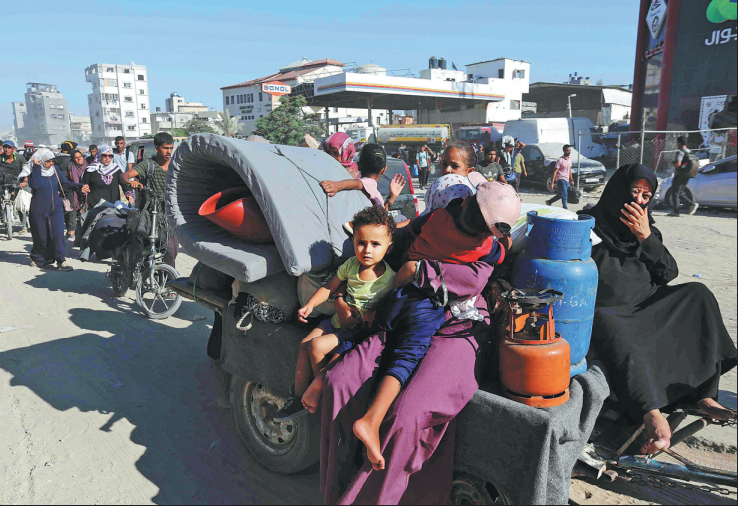Iran's restraint shows desire to de-escalate tensions: Analysts
Teheran attitude underscores peace commitment as Gaza hit by new strikes


Iran and Lebanese militant group Hezbollah's apparent restraint since Hamas leader Ismail Haniyeh's assassination on Iranian soil underscores the region's commitment to de-escalation and has nothing to do with Washington's show of force, analysts said.
They also said Iran and Hezbollah, despite being painted as "rogue" by Israel and the United States, are also trying to encourage to put "an end to the ethnic cleansing and genocide of Palestinians" and urged Washington and Tel Aviv to stop behaviors that defy international consensus.
Even as the region is bracing for Iran and Hezbollah's response, Al Jazeera reported that Khan Younis faced a heavy bombing campaign with nearly 30 air attacks, destroying buildings and infrastructure in the span of a few hours and eastern Khan Younis becoming uninhabitable, "turning gradually into a wasteland".
Thousands fled on Thursday, carrying essentials like small gas cylinders, mattresses, tents, backpacks and blankets.
Officials from Israel and the US said they believe Yahya Sinwar, Hamas' newly named political chief and one of the architects of the Oct 7 attack on Israel, could be hiding in tunnels under Khan Younis.
Mehran Kamrava, a professor of government at Georgetown University in Qatar, said Iran's restraint "so far has nothing to do with the US show of force".
US media outlet Axios first reported on Aug 4 that US Secretary of State Antony Blinken told his G7 counterparts that Iran and Hezbollah may attack Israel in the next 24 to 48 hours.
Iran and Hezbollah had earlier vowed to respond to Haniyeh's assassination, which they said was Israel's doing.
Diplomatic tone
While Iran's acting Foreign Minister Ali Bagheri Kani told the emergency meeting of the Organization of Islamic Cooperation on Wednesday that Iran has the right to self-defense, the joint communique of the 57-member Muslim bloc firmly held on to its diplomatic tone.
"One of the things we've seen consistent in the strategic behavior of the Islamic Republic of Iran is its unwillingness or inability to respond positively to threats," Kamrava told China Daily.
"The restraint that Iran has shown so far has a number of reasons, but none of those reasons have anything to do with the supposed show of US strength, which has been quite minimal so far or fears of an Israeli reprisal, which the Iranians fully expect and anticipate."
Rasha Al Joundy, a senior researcher at the Dubai Public Policy Research Centre, told China Daily that Iran "is gaining from this delay" and is able to show how much it has changed regarding its relations with Saudi Arabia and consequently other Arab leaders in the region.
"This was notable through the Saudi Ministry of Foreign Affairs statement and the OIC meeting and final statement. This demonstration of solidarity with Iran after (Haniyeh's assassination) gave diplomatic weight to Iran as a victim of aggression, not as a rogue state like Israel and US like to paint Iran," Al Joundy said.
She said Iran and the other Gulf Arab countries do not want an allout war, so the OIC meeting called on the Security Council to fulfill its role in managing conflicts, "which the Security Council is not doing due to the US backing of Israel".
Palestinian presidential spokesman Nabil Abu Rudeineh said on Thursday that Israel had entered the stage of being internationally isolated and rejected, "thanks to its aggressive policies and total disregard of the United Nations resolutions and international law", Palestine's WAFA news agency reported.
Abu Rudeineh slammed the measures as "provocative behaviors" that were intended to defy the international community and called on the US to compel Israel to halt the fighting against Gaza.
Various media outlets reported that cease-fire talks are expected to resume next week with the Israeli delegation in attendance.
A statement from Israeli Prime Minister Benjamin Netanyahu's office on Friday confirmed this, saying that pursuant to the proposal by the US and other mediators, Israel "will, on Aug 15, send the negotiations team to a place to be determined in order to finalize the details of the implementation of the framework agreement".
Mike Gu in Hong Kong and agencies contributed to this story.
jan@chinadailyapac.com

































